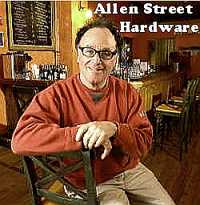Goldman branches out with cafe in converted store
By SHARON LINSTEDT
News Staff Reporter
3/8/2004

Mark Goldman, whose name is synonymous with the Calumet Arts Cafe, finds smaller is the way to go for the Allen Street Hardware Co., which he has converted into a bar and cafe.
Mark Goldman, the man many credit with pioneering the rebirth of Buffalo's Chippewa Street, is turning his attention a new venture in Allentown. Goldman has taken over the longtime home of the Allen Street Hardware Co., 245 Allen, converting the small store into a neighborhood bar and cafe.
The new business, which opened Wednesday, retains the Allen Street Hardware Co. name.
Goldman turned heads in 1990 when he purchased the Calumet Building on Chippewa Street and opened the Calumet Arts Cafe. Although it closed after 12 years, that venture kicked off the reinvention of the downtown street as an entertainment haven. He is thinking "very small" this time around - small space, small initial investment, small staff and small menu prices. "The Calumet was a huge project that took plenty of blood, sweat, tears and time, in a neighborhood that needed even more," Goldman said. "That's not the case here. This is a wonderful, diverse residential neighborhood with a great mix of merchants, and I'm just hoping to add to that."
The space-conscious bistro, open seven evenings a week, offers a low-cost list of wines, Buffalo-brewed Flying Bison Beer and an assortment of sandwiches, soups, salads and other cafe-style fare in the $4-to-$6 range. Lunches and an outdoor patio are planned.
Goldman, who calls the Allen Street neighborhood home, said he was sitting across the street from the vacant hardware store one day last summer when he decided to investigate the building's availability. He first entertained the idea of locating his office there, later hitting on the concept of a small, publike cafe where "the locals" could gather.
He leased the barely 1,200-square-foot storefront, built a wall down the middle to create an even smaller space and went to work collecting "pieces of Buffalo's past" to outfit his new dream. The resulting collection includes the bar and bar mirror from the Broderick Park Inn, plus a mishmash of wainscotting, doors, windows, tables and chairs from other dearly departed Buffalo establishments.
"We're rooted in the past and ready for the future," Goldman said.
The recycling of building parts also fits Goldman's fiscal and philosophical goals. The author and urban historian sees his venture as a model for other Buffalo start-ups.
"This is the kind of business the city and development agencies should be encouraging. This takes a few thousand dollars, not a few million, to get up and running," he said, citing efforts to lure Bass Pro Shops and other large developments to the area with millions of taxpayer dollars.
"You don't have to go to the government or to the bank to do something really small like this. We could have thousands of these kinds of businesses in Buffalo, providing service and employing people," he said.
While Goldman isn't out to change the basic fabric of Allen Street, he does see potential for it to become what he calls an "avenue of artists," featuring small-scale artist studios-galleries. In fact, half of the former hardware store now is occupied by the just-opened Storehouse Twenty Two, where artists Molly Rich and Erin Harris turn discarded household goods into decorative pieces.
As Goldman gets his new Allentown business up and running, he has not turned his back on Chippewa Street. He still owns the Calumet building at Chippewa and Franklin streets, which is home to Bacchus, operated by restaurateur Steve Calvaneso, as well as La Luna and Third Room, run by Goldman's son.
The Calumet Arts Cafe, which started life as haven for music and spoken arts, underwent several alterations over its decade-plus run. When it closed in early 2002, Goldman was operating it as an upscale restaurant, a format that proved unsuccessful with Chippewa's young, bar-oriented crowd.
Goldman continues working on plans to convert the upper floors of the striking terra cotta-tiled building into offices.
===============
Last Impressions: Mark Goldman
By PHILIP BURKE
6/6/2004
He comes from New York. He has never held office here. But Mark Goldman has become, in many hard-to-describe ways, the heart and soul of Buffalo. He is best known, of course, for bringing Chippewa Street back to life. Goldman looked at the street when it was a shabby red-light district and saw potential. He bought the Calumet building in 1988 and opened the Calumet Arts Cafe, an ambitious jazz club now sorely missed by music lovers. Other people soon followed his lead, opening bars and restaurants. One man had gotten the ball rolling for the renaissance of downtown.
That's how Goldman operates. He has been called reckless, restless and occasionally naive. But while other people talk, he takes action. He's intrigued by local history, so he went ahead and wrote several passionate books about it (including his doctoral thesis, which was on the history of Black Rock). He began leading tours. He loves diversity, so he played host to exotic envoys from other cultures, including French cabaret singers, Argentinian flamenco dancers and Cuban musicians from the movie "The Buena Vista Social Club."
Goldman has a dreamer's melancholy. He has lamented that more Chippewa bar owners haven't shared his artistic vision. "So you have more 20-year-olds getting drunk," he brooded, early on. He worries about Buffalo's relative homogeneity. "We've got to be the only city in the country that doesn't have a Chinatown. What the hell is that about?" he kvetched, memorably, last summer.
Conflicted as he is, though, he keeps at it. Not long ago, Goldman opened the Allen Street Hardware Company, an intimate little wine bar tucked into a historic building not far from Nietzsche's, near the corner of College Street. You'll find him there many nights. When you do, talk to him about Buffalo. No one knows more about us than he does.
Mary Kunz